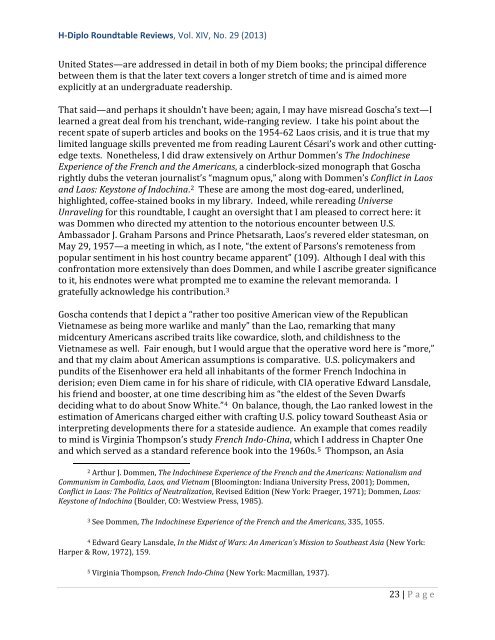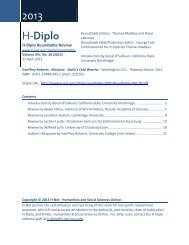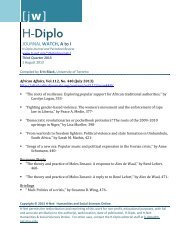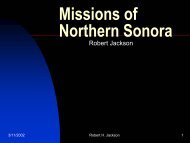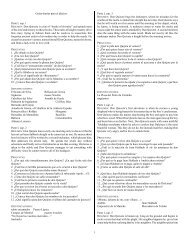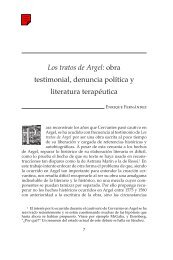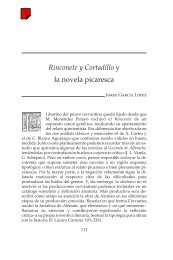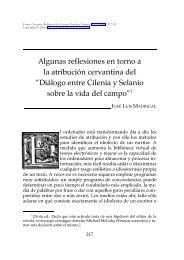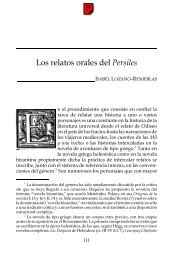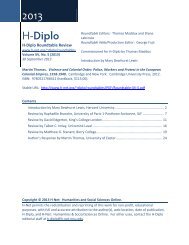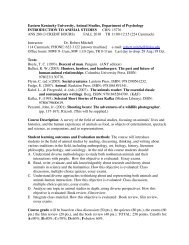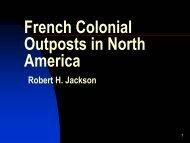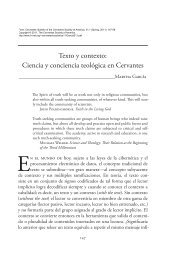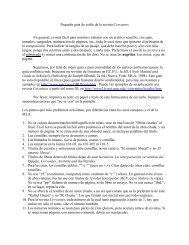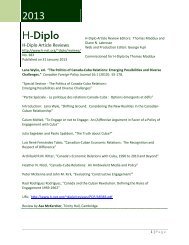H-Diplo Roundtables, Vol. XIV, No. 29 (2013) - H-Net
H-Diplo Roundtables, Vol. XIV, No. 29 (2013) - H-Net
H-Diplo Roundtables, Vol. XIV, No. 29 (2013) - H-Net
Create successful ePaper yourself
Turn your PDF publications into a flip-book with our unique Google optimized e-Paper software.
H-<strong>Diplo</strong> Roundtable Reviews, <strong>Vol</strong>. <strong>XIV</strong>, <strong>No</strong>. <strong>29</strong> (<strong>2013</strong>)<br />
United States—are addressed in detail in both of my Diem books; the principal difference<br />
between them is that the later text covers a longer stretch of time and is aimed more<br />
explicitly at an undergraduate readership.<br />
That said—and perhaps it shouldn’t have been; again, I may have misread Goscha’s text—I<br />
learned a great deal from his trenchant, wide-ranging review. I take his point about the<br />
recent spate of superb articles and books on the 1954-62 Laos crisis, and it is true that my<br />
limited language skills prevented me from reading Laurent Césari’s work and other cuttingedge<br />
texts. <strong>No</strong>netheless, I did draw extensively on Arthur Dommen’s The Indochinese<br />
Experience of the French and the Americans, a cinderblock-sized monograph that Goscha<br />
rightly dubs the veteran journalist’s “magnum opus,” along with Dommen’s Conflict in Laos<br />
and Laos: Keystone of Indochina. 2 These are among the most dog-eared, underlined,<br />
highlighted, coffee-stained books in my library. Indeed, while rereading Universe<br />
Unraveling for this roundtable, I caught an oversight that I am pleased to correct here: it<br />
was Dommen who directed my attention to the notorious encounter between U.S.<br />
Ambassador J. Graham Parsons and Prince Phetsarath, Laos’s revered elder statesman, on<br />
May <strong>29</strong>, 1957—a meeting in which, as I note, “the extent of Parsons’s remoteness from<br />
popular sentiment in his host country became apparent” (109). Although I deal with this<br />
confrontation more extensively than does Dommen, and while I ascribe greater significance<br />
to it, his endnotes were what prompted me to examine the relevant memoranda. I<br />
gratefully acknowledge his contribution. 3<br />
Goscha contends that I depict a “rather too positive American view of the Republican<br />
Vietnamese as being more warlike and manly” than the Lao, remarking that many<br />
midcentury Americans ascribed traits like cowardice, sloth, and childishness to the<br />
Vietnamese as well. Fair enough, but I would argue that the operative word here is “more,”<br />
and that my claim about American assumptions is comparative. U.S. policymakers and<br />
pundits of the Eisenhower era held all inhabitants of the former French Indochina in<br />
derision; even Diem came in for his share of ridicule, with CIA operative Edward Lansdale,<br />
his friend and booster, at one time describing him as “the eldest of the Seven Dwarfs<br />
deciding what to do about Snow White.” 4 On balance, though, the Lao ranked lowest in the<br />
estimation of Americans charged either with crafting U.S. policy toward Southeast Asia or<br />
interpreting developments there for a stateside audience. An example that comes readily<br />
to mind is Virginia Thompson’s study French Indo-China, which I address in Chapter One<br />
and which served as a standard reference book into the 1960s. 5 Thompson, an Asia<br />
2 Arthur J. Dommen, The Indochinese Experience of the French and the Americans: Nationalism and<br />
Communism in Cambodia, Laos, and Vietnam (Bloomington: Indiana University Press, 2001); Dommen,<br />
Conflict in Laos: The Politics of Neutralization, Revised Edition (New York: Praeger, 1971); Dommen, Laos:<br />
Keystone of Indochina (Boulder, CO: Westview Press, 1985).<br />
3 See Dommen, The Indochinese Experience of the French and the Americans, 335, 1055.<br />
4 Edward Geary Lansdale, In the Midst of Wars: An American’s Mission to Southeast Asia (New York:<br />
Harper & Row, 1972), 159.<br />
5 Virginia Thompson, French Indo-China (New York: Macmillan, 1937).<br />
23 | P age


